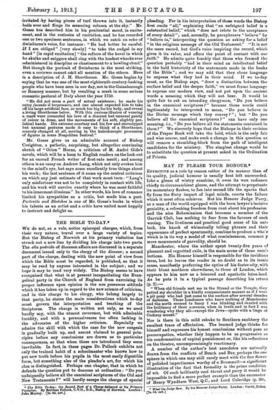THE BIBLE TO-DAY.*
WE do not, as a rule, notice episcopal charges, which, from their very nature, travel over a large variety of topics. But the Bishop of Norwich at his primary visitation has struck out a new line by dividing his charge into two parts. The olla podrida of diocesan affairs are discussed in a separate document issued only to the clergy of the diocese; a second part of the charge, dealing with the new point of view from which the Bible must be regarded, is published, so that it may be read by anyone interested in the subject ; and we hope it may be read very widely. The Bishop seems to have recognized that what is at present incapacitating the Evan- gelical party in the Church of England from exercising its proper influence upon opinion is the non possumus attitude which it has taken up in regard to the new science of criticism, and in this charge to his clergy, who belong largely to that party, he states the main considerations which to-day must govern the interpretation and teaching of the Scriptures. The charge is written not only, as we need hardly say, with the utmost reverence, but with admirable lucidity, and with a persuasiveness too often lacking in the advocates of the higher criticism. Especially we admire the skill with which the case for the new exegesis is gradually built up, and assent claimed to general prin- ciples before any conclusions are drawn as to particular consequences, so that when these are introduced they seem inevitable. In fact, in these pages Dr. Pollock exhibits not only the trained habit of a schoolmaster who knows how to put new truth before his pupils in the most easily digestible form, but something also of the pleader's art, for which his clan is distinguished. Perhaps one chapter, that in which he defends the question put to deacons at ordination : "Do you unfeignedly believe all the canonical scriptures of the Old and New Testaments ? " will hardly escape the charge of special • The Bible To-day: the Second Part of a Charge delivered at his Primary Visitation. By Bertram Pollock, C.V.O., D.D., Bishop of Norwich. London John Murray. [2s. 6d. net.] pleading. For in his interpretation of these words the Bishop first omits "all," explaining that "an unfeigned belief is a substantial belief," which " does not relate to the acceptance of every detail"; and, secondly, he paraphrases " believe " by " believe in," interpreting the question as asking for a belief "in the religious message of the Old Testament." "It is not the mere record, but God's voice inspiring the record, which gives it its value, and offers the point of contact with our faith." He admits quite frankly that those who framed the question probably " had in their mind an intellectual belief in the bald historicity of the statements made in the books of the Bible "; and we may add that they chose language to express what they bad in their mind. If we to-day must, as the Bishop says, " draw a distinction between the surface belief and the deeper faith," we must frame language to express our modern view, and not put upon the ancient words a meaning which they will not bear. It would be quite fair to ask an intending clergyman, "Do you believe in the canonical scriptures ? " because those words could legitimately be interpreted to mean, "Do you believe in the Divine message which they convey ? " ; but " Do you believe all the canonical scriptures ? " can have only one meaning, i.e., "Do you believe all the statements contained in them ? " We sincerely hope that the Bishops in their revision of the Prayer Book will take the bold, which is the only fair and wise course, and make such a change in this question as will remove a stumbling-block from the path of intelligent candidates for the ministry. The simplest change would be to substitute the question at present asked in the Ordination of Priests.










































 Previous page
Previous page